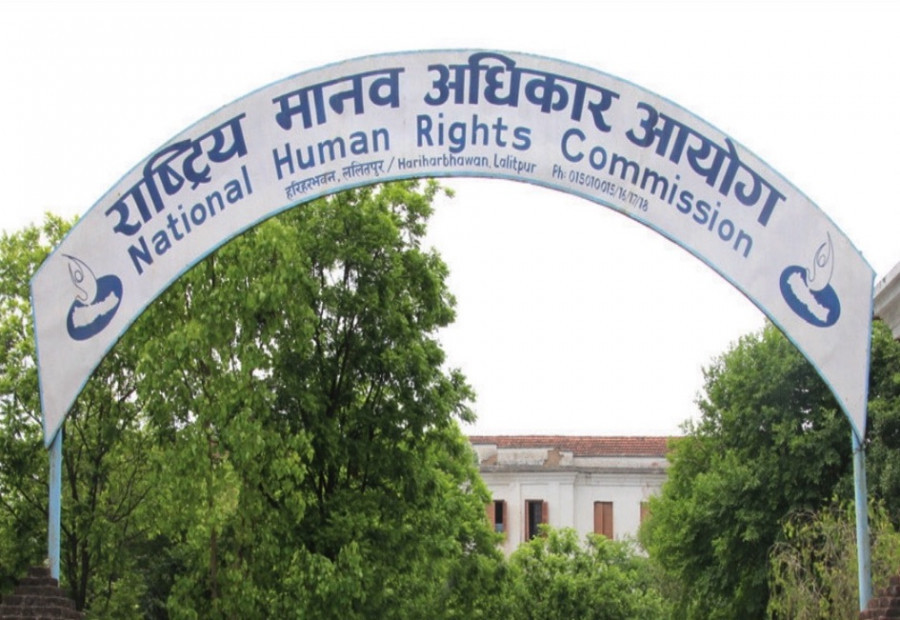National
Downgrade-wary NHRC asks for help to right itself
Court delay in settling appointment row, which influenced the global body’s punishment, concerns experts.
Binod Ghimire
Office bearers of the National Human Rights Commission (NHRC) on Wednesday submitted a memorandum to Prime Minister Pushpa Kamal Dahal requesting the government to support the restoration and construction of its offices, provide more budget, implement its recommendations, and help amend the NHRC Act to federate its organisation.
Office bearers led by its chair, Top Bahadur Magar, asked the prime minister to provide funds for the construction of the commission’s central and field offices. While the commission’s Pulchowk-based central office was destroyed in the 2015 earthquake and has yet to be rebuilt, all its regional offices have been operating from rented spaces.
Similarly, Magar’s team also requested the government to be more generous while allocating an annual budget for the commission. “We are under compulsion to expedite our work and perform better as the global umbrella body of human rights institutions has decided to downgrade our rating. But lack of resources has been a big challenge,” Surya Dhungel, a member of the commission, told the Post.
The sub-committee on accreditation of the Global Alliance of National Human Rights Institutions (GANHRI) in November last year recommended downgrading the NHRC. The decision will come into effect in October this year.
The accreditation committee had decided to downgrade the NHRC to the “B” category after the constitutional body failed to justify that the appointments made in the commission in 2021 were in line with Nepal’s domestic laws and essential requirements of the Paris Principles including the need for an open, transparent, and participatory process with broad consultations. NHRC officials believe the commission can retain its “A” status if it enhances its performance.
However, former NHRC officials think improving the performance alone would not be enough for the commission to retain the “A” status. They argue that as GANHRI’s major concern was over the appointment process, it may not review its decision unless the mistakes made in the appointment of office bearers are corrected.
Bed Bhattarai, a former secretary at the commission, said the global body’s decision to downgrade the NHRC to the “B” category was triggered by the disputed appointments at the commission, so the decision may not be reviewed until the appointments including that of the commission chief Magar are scrapped.
“What are the chairperson and members of the commission waiting for when it is evident that their very appointments are at the heart of the dispute and have brought disrepute to the rights watchdog?” said Bhattarai. “Their exit is a precondition to restoring the commission’s hard-earned reputation.”
On December 15, 2020 when CPN-UML chair KP Oli was the prime minister, the Constitutional Council had recommended 52 individuals for appointment to various constitutional bodies including at the NHRC. Based on the recommendation, President Bidya Devi Bhandari had appointed them in February 2021.
The appointments, however, had run into controversy as the Oli government had amended the Constitutional Council (Functions, duties, powers and procedures) Act-2010 through an ordinance to make it easier to convene the meeting of the Constitutional Council in the absence of the Speaker and the leader of the main opposition, the Nepali Congress at that time.
The officials were appointed without holding parliamentary hearings as the House had been dissolved at the time. Several writ petitions were filed at the Supreme Court challenging the amendment to the Act and the appointments. More than two years have passed but the cases challenging the Oli government’s decision are still sub judice.
The hearing slated for Wednesday was deferred citing the Constitutional Bench’s busy docket. It was only in June last year that the bench issued an order to the President’s Office to produce documents related to the appointments of 52 individuals.
“The Act was amended against the spirit of the constitution. Yet, the court is not serious about righting the wrong,” senior advocate Dinesh Tripathi, who also is one of the petitioners, told the Post. “The Constitutional Bench appears reluctant to settle the dispute and has not prioritised the case.”
The chairpersons and members of constitutional commissions have a six-year tenure. Those appointed after an amendment in the Constitutional Council Act have already completed a third of their tenure amid delays by the court in deciding the case. The court has rescheduled the hearing for March 21.
“It is already late for the court to pass a verdict on the appointments,” said Bhattarai. “Surprisingly the parliament hasn’t even discussed the global body’s decision to downgrade the NHRC’s status. They should be discussing it now.”




 18.12°C Kathmandu
18.12°C Kathmandu














